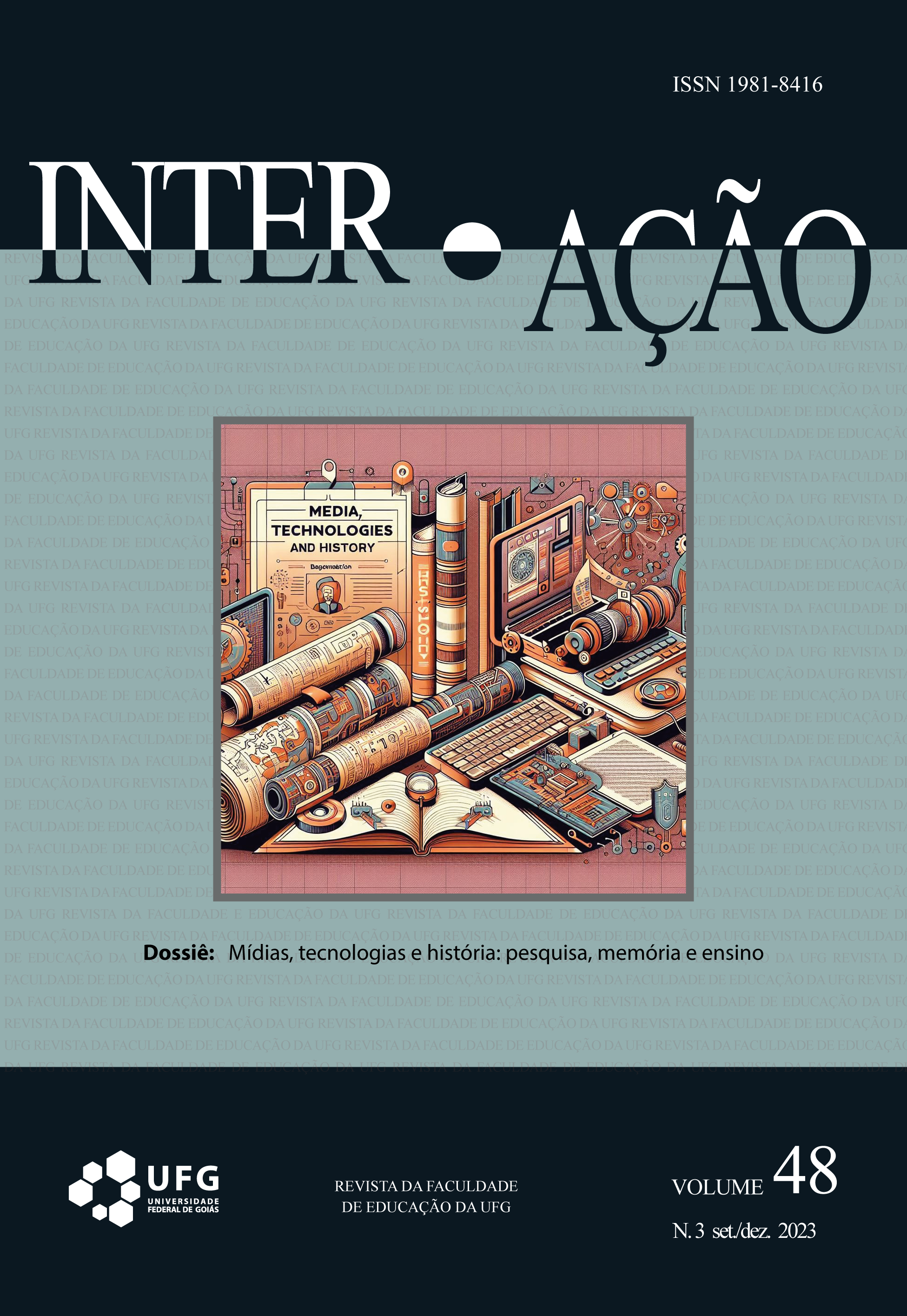AUDIOVISUAL PRODUCTION WITH WOMEN OF THE AMAZON: RESEARCH AND MEMORY OF EDUCATIONAL TRAJECTORIES IN TERRITORIES OF COUNTRYSIDE, WATERS AND FORESTS
DOI:
https://doi.org/10.5216/ia.v48i3.76680Keywords:
Educação do Campo; Mulheres da Amazônia; Produção Audiovisual; Memória.Abstract
This study aims to reflect on the memories of women graduates and students of the Degree in Rural Education: Agricultural Sciences and Biology – LEdoC of the Federal University of Amapá – UNIFAP, Campus Mazagão. The audiovisual production of mini documentaries focuses on the memories of these women's trajectory in the educational and academic, path in different territories of the Amapaense Amazon. The methodology chosen was field research, with a qualitative approach of the descriptive-analytical type, combining methods of action research and oral history of women of the countryside, waters and forests, through the production of (auto)cartographies, writings and mini documentaries, in different territories of the Amapaense Amazon. As a result, this study contributed to understanding peasant women's forms of struggle and resistance, presenting the changes in perception, empowerment and self-recognition experienced in their education at the public university.
KEYWORDS: Rural Education; Women of the Amazon; Audiovisual Production; Memory.
Downloads
References
ALVES, L. N.; ASSUNÇÃO, I.; PAZ, T. Diversidade Sexual e de Gênero. In: DIAS, Alexandre Pessoa et al. Dicionário de Agroecologia e Educação. São Paulo: Expressão Popular; Rio de Janeiro: Escola Politécnica de Saúde Joaquim Venâncio, 2021. Disponível em: https://www.epsjv.fiocruz.br/sites/default/files/dicionario_agroecologia_nov.pdf. Acesso em: 15 nov. 2023.
CALDART, R. S. Por uma Educação do Campo: traços de uma identidade em construção. In: KOLLING, E. J.; CERIOLI, P. R.; CALDART, R. S. Orgs.). Por uma Educação do Campo: identidade e políticas públicas. Brasília-DF: Articulação Nacional por Uma Educação do Campo, 2002. p. 25-36.
CALDART, R. S. Educação do Campo e Agroecologia. In: DIAS, A. P. et al. Dicionário de Agroecologia e Educação. São Paulo: Expressão Popular; Rio de Janeiro: Escola Politécnica de Saúde Joaquim Venâncio, 2021.
CARBALLEDA, A. Cartografías Sociales: lenguaje y território. In: TETAMANTI, J. M. D. Cartografía social: teoría y método. Estrategias para una eficaz transformación comunitária. Biblos: Buenos Aires, 2018.
EVARISTO, C. Olhos d'água. Rio de Janeiro-RJ: Pallas Míni, 2018.
EVARISTO, C. A escrevivência serve também para as pessoas pensarem. Entrevista concedida ao site Agência de Notícias – Itaú Cultural, novembro de 2020. Disponível em: https://www.itausocial.org.br/noticias/conceicao-evaristo-a-escrevivencia-serve-tambem-para-as-pessoas-pensarem/. Acesso em: 15 nov. 2023.
MENDES, D. M.; REIS, M. dos; WANDERLEY, K. K. dos S. Juventude da floresta: visões, canções e modo de vida de uma Amazônia extrativista. Revista Inter-Ação, Goiânia, v. 47, n. 2, p. 389–406, 2022. Disponível em: https://revistas.ufg.br/interacao/article/view/72163. Acesso em: 15 nov. 2023.
NEVES, D. P.; MEDEIROS, L. S. (Orgs.) Mulheres camponesas: trabalho produtivo e engajamento políticos. Niterói: Alternativa, 2013.
REGO, M. H. Cartografias de si no Feminismo da Diferença: Amelinha, Gabriela, Norma. Gênero, Niterói, v. 10, n. 2, p. 151-175, 2010. Disponível em: https://periodicos.uff.br/revistagenero/article/view/30875. Acesso em: 15 nov. 2023.
SEIBERT, I. G.; GUEDES, L.; MARFORT, K. Feminismo Camponês e Popular. In: DIAS, Alexandre Pessoa et al. Dicionário de Agroecologia e Educação. São Paulo: Expressão Popular; Rio de Janeiro: Escola Politécnica de Saúde Joaquim Venâncio, 2021. Disponível em: https://www.epsjv.fiocruz.br/sites/default/files/dicionario_agroecologia_nov.pdf. Acesso em: 15 nov. 2023.
SILVEIRA, E. História Oral e memória: pensando um perfil de historiador etnográfico. MÉTIS: história & cultura, São Paulo, v. 6, n. 12, p. 35-44, jul./dez. 2007. Disponível em: http://www.ucs.br/etc/revistas/index.php/metis/article/view/835. Acesso em: 15 nov. 2023.
TETAMANTI, J. M. D. Hacia una geografía comunitária: abordajes desde cartografía social y sistemas de información geográfica. Comodoro Rivadavia: Universitaria de la Patagonia – EDUPA, 2014. Disponível em: https://ri.conicet.gov.ar/bitstream/handle/11336/187320/CONICET_Digital_Nro.686406ba-90d7-44fc-84dc-0868c6871459_B.pdf?sequence=2&isAllowed=y. Acesso em: 15 nov. 2023.
THIOLLENT, M. Metodologia da pesquisa-ação. São Paulo: Cortez, 2011.
Published
How to Cite
Issue
Section
License
Copyright (c) 2023 Debora Mate Mendes, Eliane Aparecida Cabral da Silva, Marlo dos Reis, Suany Rodrigues da Cunha

This work is licensed under a Creative Commons Attribution-NonCommercial 4.0 International License.
Inter-Ação uses the Creative Commons Attribution 4.0 License for Open Access Journals (Open Archives Initiative - OAI) as the basis for the transfer of rights. Open access means making documents available on the Internet free of charge, so that users can read, download, copy, distribute, print, search, or link to the full text of documents, process them for indexing, use them as input data for software programs, or use them for any other lawful purpose, without financial, legal, or technical barriers.
Authors publishing in this journal agree to the following conditions:
1) Authors retain copyright and grant the journal the right of first publication, with the work simultaneously licensed under the Creative Commons Attribution License, which permits redistribution of the work with attribution and first publication in this journal.
2) Authors are permitted to enter into additional, separate agreements for non-exclusive distribution of the version of the work published in this journal (e.g., for publication in an institutional repository or as a book chapter), with attribution and first publication in this journal.
3) Authors are permitted and encouraged to publish and distribute their work online (e.g. in institutional repositories or on their home page) at any time before or during the editorial process, as this may generate productive changes as well as increase the impact and citation of the published work.















